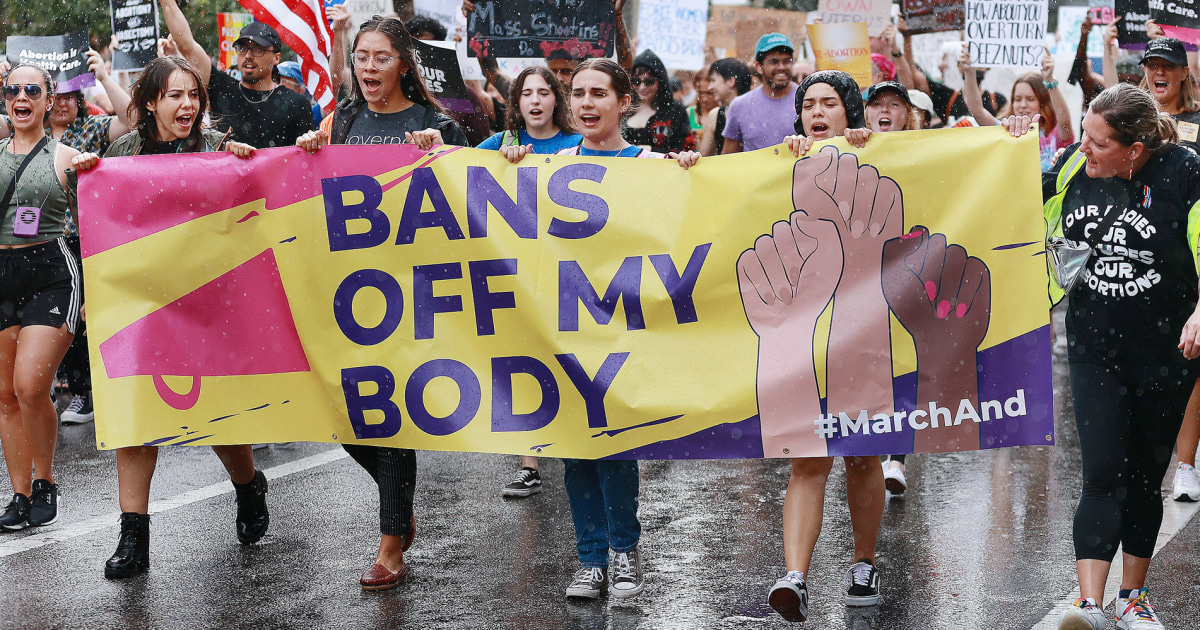By Aria Bendix -
NBC News
If the Supreme Court overturns Roe v.
Wade, the decision would more immediately and directly affect more than 300,000 women who are pregnant now or will be pregnant before July in the 13 states that would ban abortion outright.
That's the number of people who -- according to an NBC News analysis of 2017 data from the U.S. Census Bureau and the Guttmacher Institute, which supports abortion rights -- would see their states' abortion policies change while they still are at points in their pregnancy where they might otherwise have been eligible for abortion.
The laws that determine your options
would be reversed almost overnight.
Since the leaked draft Supreme Court opinion published by Politico last week is just that, a draft, talk of its implications has been kept in the realm of the hypothetical.
But it doesn't seem hypothetical to Sarah Carpenter, who is six months pregnant in Louisiana.
A doctor performs a sonogram on a pregnant woman. NBC News.
Carpenter claimed she had a miscarriage in September, opening her eyes to how much can go wrong between conception and birth.
In that regard, she said, her current pregnancy seems "pretty easy," though she often vomits so forcefully that blood vessels in her face rupture.
Still, Carpenter worries about worst-case scenarios, like many parents-to-be.
That anxiety has been amplified by the prospect of the Louisiana law.
[We debunk 5 myths about abortion in the United States]
“Now I am 26 weeks pregnant, I love this baby very much, his room is ready,” she said.
"But if we go to another anatomical scan and his brain is not developed or his heart is not developed, if there is something that is not compatible with life, what would that look like?"
A 30-year prison sentence is imposed on a woman who suffered a miscarriage in El Salvador
May 12, 202201:39
Currently, Louisiana allows abortion up to 22 weeks, with exceptions after that date if the baby does not survive or there is a serious threat to the physical health of the mother.
Carpenter's baby is already viable, although she is likely to still be pregnant at the end of June, when the court's decision is expected.
If
Roe
is struck down , all abortions in the state would be illegal unless the life of the mother is at stake.
[These are the risks to women's health if Roe v. wade]
Jessica Horton, a Salt Lake City attorney who is five months pregnant with her fourth child, shares Carpenter's concerns.
Utah law makes exceptions for serious birth defects, rape, incest, or threat of serious injury or death to the mother.
Still, Horton says she's worried.
"Being pregnant, I want to have the full range of options in case something goes wrong: to be able to choose what is best for me, for my husband, for the children I already have and for the baby," she said.
Deciding to terminate the pregnancy for medical reasons
Most abortions in the United States occur at or before nine weeks' gestation, according to the Centers for Disease Control and Prevention.
About 6% of American women seek abortions out of concern for their own health, according to a 2013 survey. A 2015 study found that about 4% of abortions occur in wanted pregnancies, often for issues such as fetal abnormalities.
Discontinuation for this reason usually occurs later in the pregnancy, at or after 21 weeks.
This is because
ultrasound usually doesn't give a clear picture of abnormalities until 18 to 20 weeks
, and patients must wait until about halfway through their pregnancy to undergo tests such as amniocentesis to diagnose genetic disorders.
The Supreme Court decision on the
Roe
case is likely to come in about seven weeks.
How do the abortion pills that some states ban and others promote work?
May 9, 202200:56
Even in states that will continue to allow abortion until such time as the fetus can survive outside the womb - about 24 weeks after the start of the mother's last menstrual period - that still gives some people only a week or two, or perhaps less, to decide whether to terminate the pregnancy after discovering a fetal abnormality or other problem.
That was the case for Denise Miller, a teacher from suburban Philadelphia, who discovered in 2005, around 21 weeks pregnant, that her baby had signs of a rare birth defect that would leave one side of her heart underdeveloped. .
At 23 weeks, Miller still did not have the final results of her amniocentesis, but Pennsylvania law prohibits abortions after 24 weeks.
[Banning Abortion Doesn't Stop It: Why You're Worried the Supreme Court Will Overturn Roe v. wade]
“Right away they told us we had to make a decision: Do we want to continue the pregnancy?” she said.
Miller and her husband made the painful decision to have an abortion.
Two days later, they received the results of the amniocentesis: The fetus also had a severe case of a chromosomal disorder called DiGeorge syndrome.
Protests for the right to abortion reach the homes of two Supreme Court magistrates
May 8, 202201:44
“It would have been a very short, painful and difficult life, so it was reassuring to feel that we had made the right decision,” Miller said.
“Of course, we were devastated.
I feel like it was the darkest point of my entire life.”
Miller is now the administrator of a support group called Ending a Wanted Pregnancy.
Its members are devastated by the prospect of
Roe
being overturned, she said.
Some pregnant women fear for their own health
Michelle Baker, a Texas resident who is six months pregnant, says she worries that her state's law could affect her physical health.
Texas already allows citizens to sue anyone who provides abortion services or helps someone get an abortion after six weeks of pregnancy.
But if Roe
is overturned ,
the law would automatically ban all abortions except to prevent the death or serious injury of the mother.
Baker said she worries about how doctors might interpret that exception in the law.
White House seeks alternatives for women if Supreme Court strikes down abortion rights
May 5, 202201:58
"If something happens at the time I'm giving birth, let's say there's a complication, are they going to try to save my life?" she said.
Horton also said that if she ever gets pregnant again, the gray area around exceptions in the law in Utah would be stressful.
Crossing state lines
After Texas banned six weeks of abortion in September, some pregnant women from that state sought abortions in Oklahoma.
When that state instituted its own six-week ban last week, clinics began directing patients to Arkansas or Kansas.
Abortion clinics in states without restrictive laws have already braced themselves for the influx of patients.
“I come from a privileged place where I have the means to be able to travel out of state.
We have family in California, so if we needed to, we could go somewhere else,” Horton said.
"But I fully recognize that's not an option for everyone."















